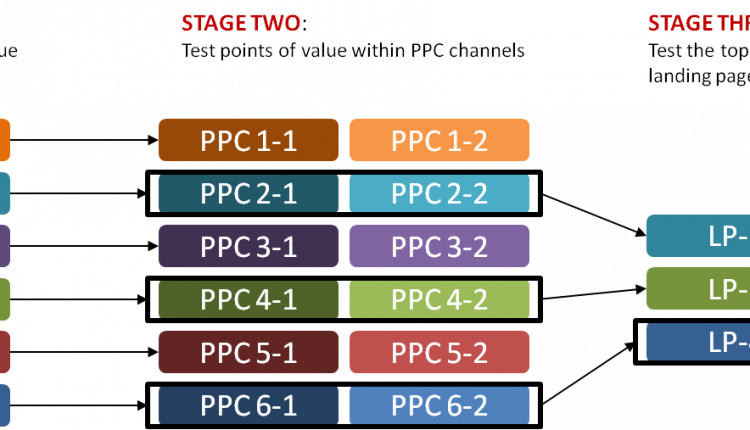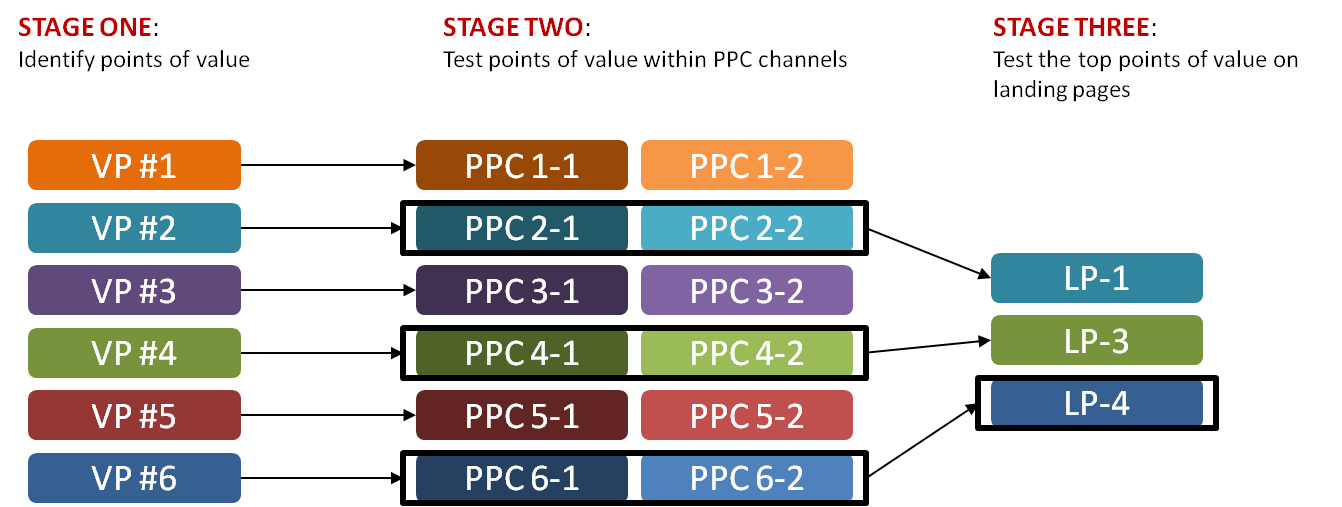Your Value Proposition is at the bottom of every decision made by every visitor for every action they make on your Website. And so when comparing the significance of this fundamental force of value with the transient nature of a PPC ad that has at most 130 characters, it might seem as if I am trying to put David on a seesaw with Goliath.
However, though seemingly small and comparatively insignificant, a PPC ad can provide an invaluable resource for marketers trying to identify and craft an effective Value Proposition. And like the rudder of a ship directs something 1000 times its size, I believe a PPC ad can inform the bedrock of all your marketing efforts, namely, your Value Proposition.
What exactly is a Value Proposition?
But before diving any deeper, we should get clear on what I actually mean by the term Value Proposition. At MarketingExperiments we define your Value Proposition as the answer you have to one simple question: Why should your ideal prospect buy from you rather than any of your competitors? So, your Value Proposition is not a catchy slogan or a detailed business plan, but rather a concise, clear, and credible answer to this question.
Seems simple, yet the answers we often receive from marketers are confusing, unappealing, braggadocios, vague, and sound just like the claims everyone else is making. So, how would you answer this question about your online offer? Can you state it clearly in about ten words or less? Take a minute and give it some thought…
We will teach more on the aspects of a good Value Proposition during today’s live web clinic, but for now, it is sufficient to understand that your Value Proposition is that primary reason why your ideal prospect should buy from you rather than your competitors.
How can a PPC ad help you find your Value Proposition?
So now that we are all on the same page with terms and meanings (and hopefully you’re thinking of a specific Value Proposition even now), the claim I made at the beginning of this post remains unsupported. How can something as insignificant as a PPC ad help your Value Proposition?
Well it’s quite simple and yet very powerful. PPC advertisements provide a testing environment uniquely suitable for Value Propositions. It is almost as if search marketing was designed as a custom-fit workout for Value Propositions. Think about it – how often do you find a testing environment that naturally keeps Value Proposition in isolation, provides strict constraints on the amount of words you can use, all the while, pitting you against your top competitors? Let’s take these one-by-one:
- Value is isolated – First, in a PPC ad you are primarily testing statements of value. Friction is not an issue you can control, nor are there significant sources of Anxiety at this stage in the process. At the bottom of it all, it’s how you craft a statement of value that determines the effectiveness of a PPC ad.
- Succinctness is forced – Next, due to the constraints on the amount of characters per line, marketers are forced to tightly craft their statements of value. Remember, as mentioned above, the most effective Value Propositions are the ones that can be stated in ten words or less. PPC ads force you to do this.
- Competition is present – And finally with PPC, your competition is always a few pixels away, meaning that when running a campaign, you are directly testing your claims of value against your competitors’. Why should your ideal prospect buy from you rather than your competitors? Well, PPC enables your customers to vote directly.
There are more reasons why PPC ads are uniquely suitable for testing Value Propositions (the low costs, quick statistical validation, the ability to isolate traffic sources, etc.), but the above three are probably the most note worthy.
How do you set up a Value Proposition/PPC test?
Testing Value Propositions isn’t just a valuable proposition – it’s a reality. And often at MarketingExperiments, our researchers like to start a new research project by testing the core Value Proposition of an offer. For practitioners, this usually unfolds in the three stages modeled below. As you can see, PPC plays a significant role in the process.
In STAGE ONE, the most compelling reasons why your ideal prospect should buy from you rather than your competitors are determined. In STAGE TWO, you craft and test unique PPC ads for each of the compelling reasons identified in the first stage. Often, multiple PPC ads should be created for each concept to ensure optimal wording. Finally, in STAGE THREE, you take the top performing concepts based upon the PPC testing and begin to integrate them (not necessarily in isolation) into the design of your landing pages to be tested.
This three-staged process has been used by our researchers over and over to help companies identify and refine their core Value Proposition. In fact, we just recently ran this exact test design to determine the optimal Value Proposition for a new product being launched by one of the largest organizations in Canada. I hope to have more details on this experiment in future postings.
Overall, though this is a simple testing process, it can yield some of the most valuable marketing insights for your online efforts. And in this way, something as peripheral as a PPC ad can contribute to something as foundational as a company’s Value Proposition.
TODAY’S WEB CLINIC: Crafting Effective PPC Ads
Probably the most difficult part of this testing process is taking a statement of value in STAGE ONE and translating that into a succinct, clear, and effective PPC ad to test in STAGE TWO. The very constraints that make PPC ads good for testing Value Proposition are often the same constraints that lead marketers to craft poorly written PPC ads.
Overcoming these and other challenges regarding PPC is exactly with Dr. Flint McGlaughlin will be covering during today’s live Web clinic. So, whether you’re testing PPC ads or just trying to increase quality traffic, today’s live interactive presentation is something worth attending. Plus, he will be conducting his infamous live optimization of audience-submitted campaigns which is aways very entertaining and enlightening.
Related Resources:
Powerful Value Propositions: How to Optimize this Critical Marketing Element – and Lift Your Results
This Just Tested: How PPC specificity drove 21% more clicks and cut costs 66%
PPC Ad Optimization: Testing, unique landing pages, and honesty





Excellent post on an overlooked method for testing everything from value props to new product concepts. It would be even better next time if you could incorporate an example that would give the concept you are conveying some teeth.
It doesn’t require much research to see that relatively few marketers, on or off line, grasp the requirement for brand or product differentiation which is somewhat similar to a “value proposition.” I happen to feel value proposition is kind of buzz-wordy. Its too often a case of no strategy before diving into tactical execution, like an ad, PPC or otherwise. What seems to be missing from this discussion is mention of:
– being well aware of customer values that have already be claimed by competitors (not creating your differentiation in a vacuum. Differentiation must be AGAINST competitors)
– the need to create separate competitive differentiation strategies (or value propositions) in various markets where you meet a different set of competitors (markets are not globally uniform)
– the stage of business your brand/product may be in (New, Growth, Mature, Revival)
These variables all affect how strategies are created and what may be more or less successful for a given brand.
Terrific approach. We have been experimenting with VP testing with PPC ads but carrying it through to the landing page makes a ton of sense.
I am sad I missed your web clinic.
One question we have not yet answered is how to control for keyword/audience selection skewing your results.
Scott Armstrong
BrainRider
Interesting approach, I will have to try this out. We’ve done well with stating the service we offer and the price, but it will be interesting to see if cost of customer acquisition increases or decreases with value prop based ads.
thanks for breaking this down and sharing your own methodology.
Looking forward to watching the web clinic.
This is exceptional! I love it!! How do I find the link for the live web class and optimization?